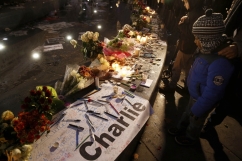France may close up to 160 mosques suspected of harbouring preachers with extremist views, according to one of the country's chief imams.
The closures will take place under the state of emergency imposed after the Paris shootings.
Three mosques have already been shut, nine people have been arrested and another 22 have been banned from leaving the country.
However, Hassan El Alaoui, the Muslim chaplain-general who is in charge of nominating regional and local Muslim imams and mediating between the imams and prison officials, told Al Jazeera on Wednesday: "According to official figures and our discussions with the interior ministry, between 100 and 160 more mosques will be closed because they are run illegally without proper licenses, they preach hatred, or use 'takfiri' speech," he said.
Takfiris are classified as Muslims who accuse others of the same faith of apostasy (the abandonment of religious belief or principle), leaving them open to violent retribution including murder.
"This kind of speech shouldn't even be allowed in Islamic countries, let alone secure countries like France," said El Alaoui.
Felix Marquardt, a Parisian Muslim and cofounder of the al-Kawakibi Foundation, which works towards Islamic reformation, also told Al Jazeera that he expects more mosques to be closed. He said he had visited mosques in various French cities and was "shocked" by what he had heard.
"There was a world view that was quite worrisome. I'm talking about the politicisation of Islam. I've heard some speeches that tend to promote the notion among Muslims present that Islamophobia is organised by the French state, that somehow non-Muslim French people are against the Muslim minority."
A series of attacks in Paris last month left 130 people dead, including 89 at the Bataclan Theatre where attackers opened fire with machine guns. Islamic State claimed responsibility for the murders, which have focused attention on the problem of "home-grown" terrorists radicalised by extremist preachers.















